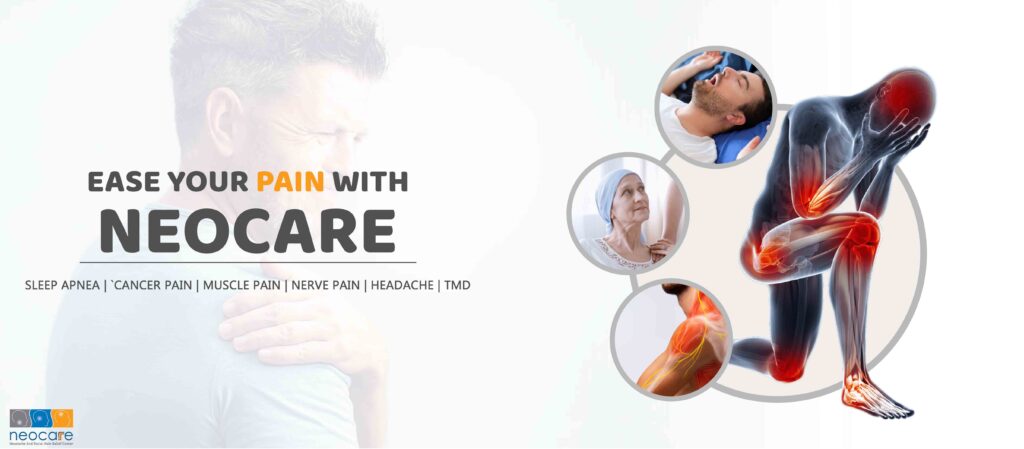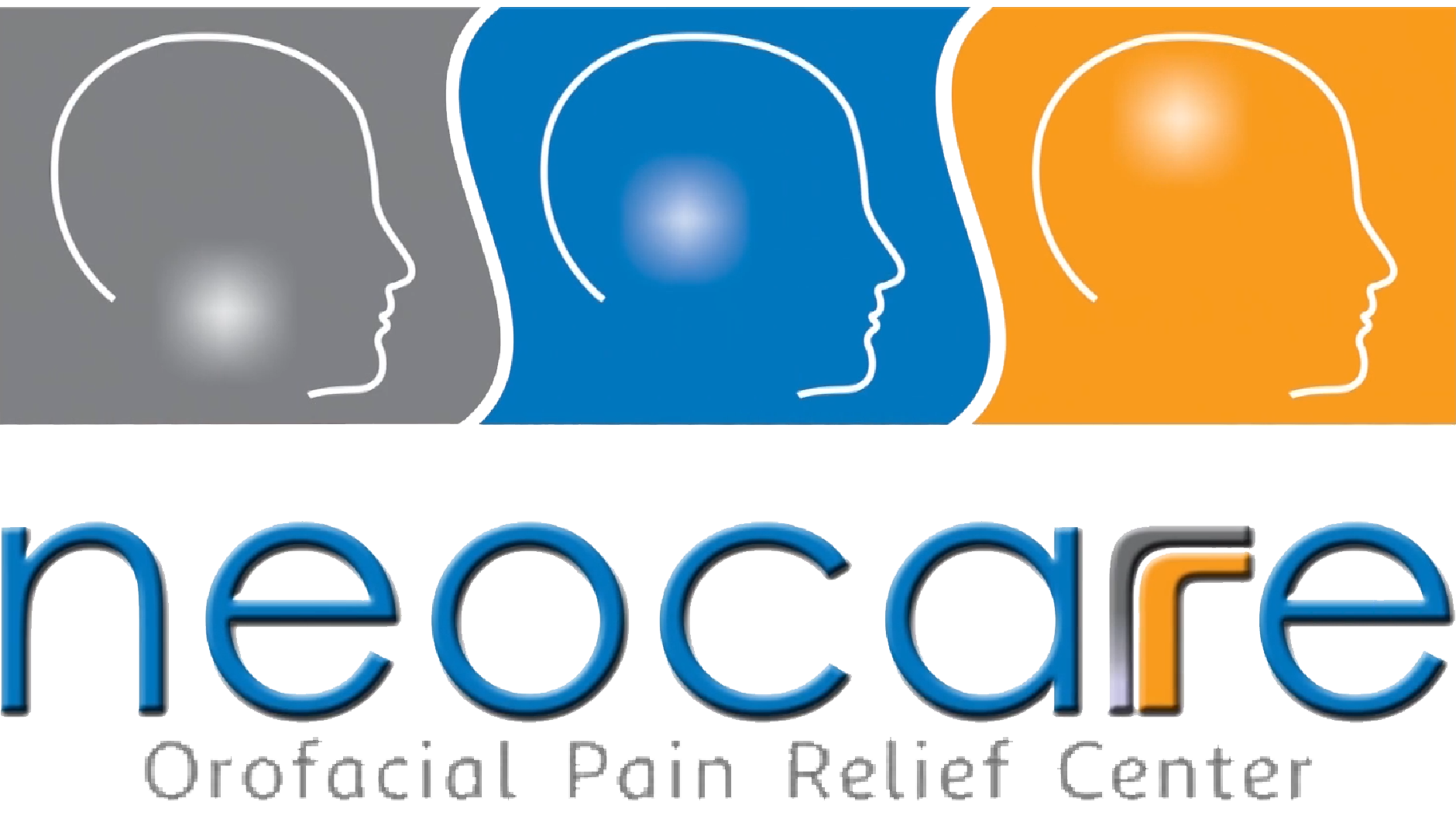Welcome to Neocare
Orofacial Pain Relief Center
Welcome to the best pain management clinic in Mumbai and NaviMumbai.
Neocare is an advanced pain clinic in Navi Mumbai for non-surgical treatment of chronic pain conditions including jaw pain, TMJ pain, nerve pain, headaches, facial pain, musculoskeletal pain and cancer pain. It is one of the best pain management centers in India.
Understanding Orofacial Pain: Causes, Symptoms, and Treatment
Orofacial pain refers to discomfort or pain experienced in the mouth, jaws, face, head, or neck region. It can range from mild discomfort to severe, debilitating pain, impacting various aspects of daily life. While orofacial pain can result from numerous underlying conditions, understanding its causes, symptoms, and available treatments is essential for effective management. In this article, we’ll explore the common causes of orofacial pain, typical symptoms, and approaches to treatment for the general public.
Common Causes of Orofacial Pain:
- Dental Issues: Tooth decay, gum disease, abscesses, or dental trauma can lead to localized orofacial pain.
- Temporomandibular Joint Disorders (TMD): Dysfunction or inflammation of the temporomandibular joint (TMJ) can cause jaw pain, clicking or popping noises, and difficulty chewing.
- Bruxism: Teeth grinding or clenching, often occurring during sleep, can result in jaw pain, headaches, and worn-down teeth.
- Sinus Infections: Inflammation or infection of the sinuses can cause facial pain, pressure, and tenderness around the cheeks, eyes, and forehead.
- Neuralgia: Conditions like trigeminal neuralgia involve nerve pain in the face, characterized by sudden, intense episodes of stabbing or electric shock-like pain.
- Muscle Tension: Stress, poor posture, or muscle strain can lead to tension in the facial muscles, resulting in discomfort or pain.
- Migraines and Headaches: Certain types of headaches, including migraines, can cause orofacial pain along with other symptoms like sensitivity to light and sound.
Symptoms of Orofacial Pain:
The symptoms of orofacial pain can vary depending on the underlying cause but may include:
- Persistent or intermittent pain in the mouth, jaw, face, or neck.
- Tenderness or sensitivity in the affected area.
- Difficulty chewing, talking, or opening the mouth wide.
- Clicking, popping, or grinding noises in the jaw joint.
- Headaches or migraines, often accompanied by facial pain.
- Swelling or inflammation in the facial tissues.
- Pain exacerbated by specific activities or triggers, such as chewing or stress.
Treatment Approaches for Orofacial Pain:
- Dental Treatment: Addressing underlying dental issues like cavities, gum disease, or misaligned teeth can alleviate orofacial pain.
- Medications: Over-the-counter or prescription medications may be recommended to manage pain and inflammation associated with orofacial conditions.
- Physical Therapy: Techniques such as jaw exercises, massage, or stretches can help relieve muscle tension and improve jaw function in TMD cases.
- Night Guards: For individuals with bruxism, wearing a custom-fitted night guard can protect teeth from grinding and alleviate associated symptoms.
- Stress Management: Practicing relaxation techniques, stress reduction strategies, or seeking counseling can help manage orofacial pain triggered by stress or anxiety.
- Injections or Nerve Blocks: In cases of severe or chronic pain, injections of corticosteroids or nerve blocks may be used to alleviate symptoms and provide temporary relief.
- Surgical Intervention: In rare instances where conservative treatments fail to provide relief, surgical procedures may be considered, such as TMJ arthroscopy or joint replacement.
Conclusion:
Orofacial pain can significantly impact an individual’s quality of life, affecting everyday activities such as eating, speaking, and sleeping. Seeking timely evaluation and treatment from a qualified healthcare professional, such as a dentist or oral surgeon, is crucial for accurate diagnosis and effective management. By understanding the common causes, recognizing symptoms, and exploring available treatment options, individuals experiencing orofacial pain can take proactive steps towards finding relief and improving their overall well-being. If you or someone you know is experiencing persistent orofacial pain, don’t hesitate to seek professional guidance for proper evaluation and care.
Trusted Pain Clinic in Mumbai and NaviMumbai
- Treatment based on Diagnosis
- Best Non-Surgical Treatment
- Internationally trained Doctor
Conditions We Treat
- Jaw Pain
- TMJ Pain
- TMD
- Nerve Pain
- Sleep Apnea
- Headache
- Face Pain
- Muscle Pain
- Cancer Pain

Frequently Asked Questions
What is a Pain Clinic ?
A pain clinic is a medical facility or specialized center that focuses on the diagnosis and management of chronic pain. These clinics typically employ a multidisciplinary approach, meaning they involve a team of healthcare professionals from various fields such as pain medicine, physiotherapy, psychology, and other disciplines to provide comprehensive care for individuals suffering from chronic pain conditions.
Pain clinics offer a variety of treatment options tailored to each patient’s needs, which may include medications, physical therapy, nerve blocks, injections, psychological counseling, alternative therapies (such as acupuncture or chiropractic care), and in some cases, surgical interventions. The goal of a pain clinic is to help patients manage their pain effectively, improve their quality of life, and, when possible, reduce their reliance on pain medications. These clinics also play a role in educating patients about their conditions and empowering them to take an active role in managing their pain.
What is Orofacial Pain ?
Orofacial pain refers to discomfort or pain experienced in the face, mouth, jaws, and associated structures. It can originate from various sources, including dental problems, TMJ disorders, nerve disorders, muscle disorders, or other medical conditions.
What are common causes of orofacial pain ?
Common causes include dental conditions (tooth decay, gum disease), TMJ disorders, trigeminal neuralgia, muscle disorders (myofascial pain syndrome, bruxism), neurological disorders (migraine headaches), sinusitis, and structural abnormalities.
What services does your orofacial pain clinic offer ?
Our clinic offers comprehensive evaluation, diagnosis, and management of orofacial pain conditions. Services include thorough consultations, diagnostic imaging, medication management, dental interventions, physical therapy, lifestyle recommendations, and, when necessary, referrals to specialists for advanced care.
How do I schedule an appointment at your clinic ?
To schedule an appointment, please contact our clinic directly via phone or email. Our friendly staff will assist you in scheduling a convenient appointment time and provide any necessary information regarding preparation for your visit.
What should I expect during my first visit to the orofacial pain clinic ?
During your initial visit, you’ll undergo a comprehensive evaluation by one of our experienced healthcare providers. This may include a thorough medical history review, physical examination, and possibly diagnostic tests such as imaging studies. Based on the evaluation, a personalized treatment plan will be developed to address your specific needs.
What treatment options are available for orofacial pain ?
Treatment options vary depending on the underlying cause of the pain and may include medication management, dental interventions, physical therapy, relaxation techniques, lifestyle modifications, and in some cases, surgical procedures. Our team will work closely with you to determine the most effective treatment plan tailored to your individual needs.
Does your clinic offer telemedicine appointments for orofacial pain consultations ?
Yes, we understand the importance of accessibility and convenience for our patients. We offer telemedicine appointments for initial consultations and follow-up visits, allowing patients to receive expert care from the comfort of their own homes.
How can I learn more about orofacial pain and its management ?
Our website features valuable resources, including educational articles, patient testimonials, and information about common orofacial pain conditions and treatment options. Additionally, our healthcare providers are available to answer any questions you may have during your visit or via telemedicine appointments.
For more information or to schedule an appointment, please contact our clinic today. We’re dedicated to helping you find relief from orofacial pain and improve your quality of life.
Certificates












